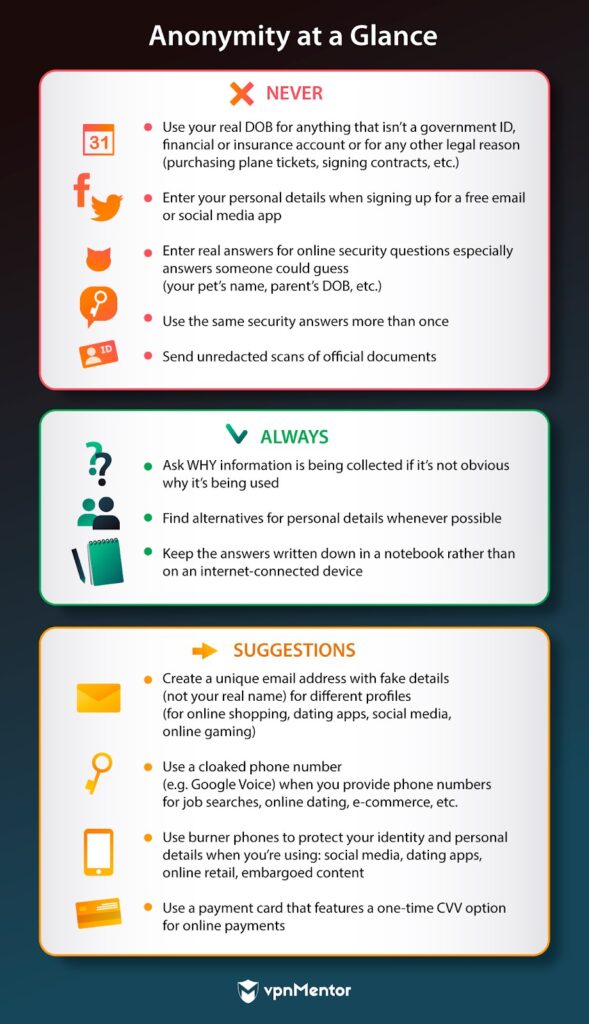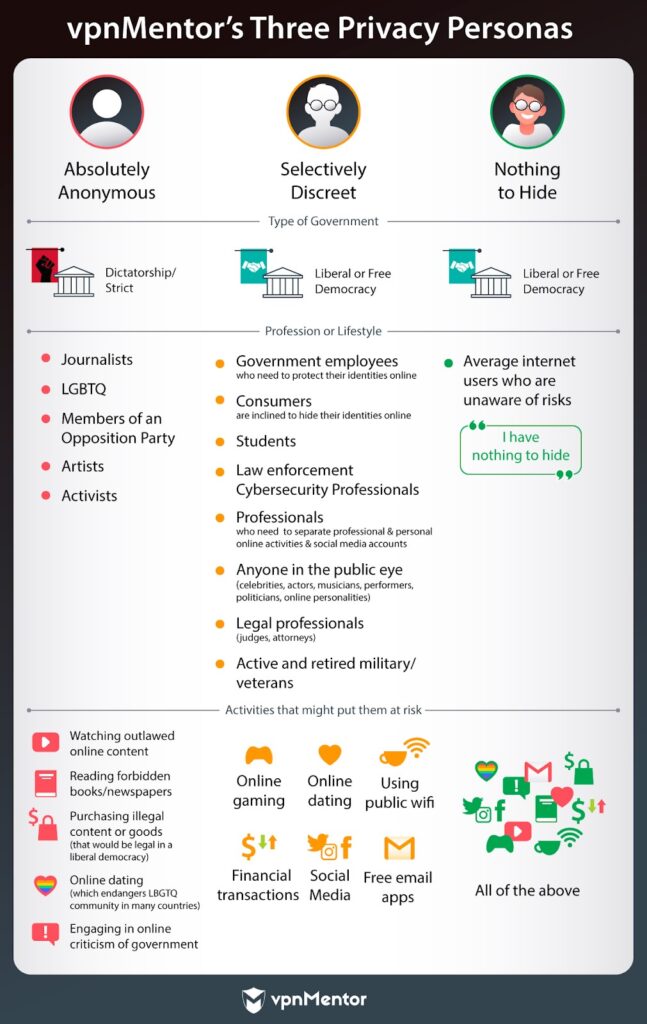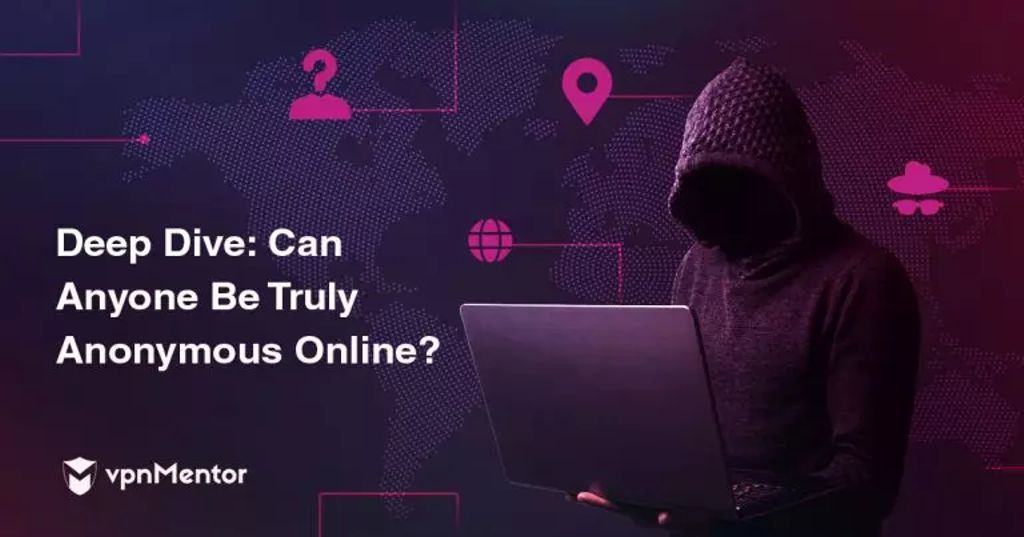With tech giants becoming more and more central to our daily lives, the internet is increasingly scrutinized for its lack of anonymity. As cyberattacks and data breaches are the subject of more and more headlines, it’s hard not to question how secure your identity ever truly is online. According to a recent study, nearly half of Americans are convinced their personal data is less secure than it was five years ago. In that same study, 14% of the surveyed claim a fraudster tried to take out loans and credit lines in their names. In 2014, according to government data, 7% of all U.S. residents 16 or over were victims of identity theft.
Concern about online anonymity stretches well beyond identity theft. In 2019, Human Rights Watch issued a report that advised a 12-point code of conduct for students and educational professionals under threat from surveillance by the Chinese government. From the report: “Chinese authorities have long monitored and conducted surveillance on students and academics from China and those studying China on campuses around the world. Chinese diplomats have also complained to university officials about hosting speakers – such as the Dalai Lama – whom the Chinese government considers “sensitive.”
No matter what’s driving your concerns about risk–whether it’s an intrusive and overbearing government or more general and common-sense apprehensions regarding identity theft–it’s wise to investigate where and how you can attain different levels of anonymity online. Our guide goes beyond addressing and rehashing the well-known methods to protect your identity (firewalls, antivirus software, VPNs, onion routers, etc.).
Said another way: this isn’t just another “how to protect yourself online” guide. This is a personalized, well-researched, and informed critical discussion of how and where you can hide behind complete anonymity while you conduct yourself personally and financially online.
We will also explain the critical difference between privacy and anonymity. Think of this distinction: privacy applies to actions and anonymity applies to your identity. You can attain privacy in an instant by browsing the web using a VPN plugin in a browser. Shielding your identity–your real name, where you live, your date of birth, your family’s names and more–is more time consuming and complex.
And how doable is it? Living an online life (using an email account, interacting on social media, banking, shopping) makes complete anonymity almost impossible.
You can, however, decide where and when you want or need to be anonymous, which is precisely the focus of this guide.
Our guide explains:
- When you can be completely anonymous online
- How to isolate experiences and activity on the web when your activity needs to be absolutely anonymous
- Who needs to protect their anonymity more than others and when and how to execute that
- Apps and organizations that are notorious for sharing personal details vs. those that are devoted to protecting both your identity and your privacy
How Hackers Get Your Info?
Hollywood and entertainment has gone out of its way to create a glamorous and often mythic quality to cybercrime and cybercriminals. Films and TV shows (looking at you, Mr. Robot) often involve depictions of fast and easy hacking, that anyone with a decent internet connection and a USB thumb drive can break encryption codes. While there are definitely some hackers who are better than others: the notion that true encryption is breakable is pure fantasy.
When an app or a website leverages actual 256-bit encryption: it’s unbreakable. The issue is the amount of companies that are lax or utterly negligent when it comes to encrypting user data behind a secure firewall. In short: the encryption standards aren’t to blame. It’s when they aren’t properly implemented that users suddenly find their personal data has been leaked.
In truth: hackers aren’t all that remarkable. They, like most criminals, are looking for easy opportunities to use your identity to open lines of credit or use your credentials to make online payments.
For example, in 2014 when many celebrities discovered leaked photos of them online, it wasn’t because a genius hacker familiar with breaking through layers upon layers of firewalls broke into various iCloud accounts. The criminal in question used the oldest trick in the book, and sent out phishing software (disguised-barely-as Gmail and iCloud requests) to capture usernames and passwords.
From the perspective of protecting your anonymity: it remains a user beware world. Some companies are better than others at safeguarding your data. The more you educate yourself (something you’re doing right now by reading this guide for example) the less likely that your personal information will end up in the hands of a cyberthief.
Governments and Privacy: Who is the Strictest?
Becoming the victim of cybertheft is one thing, and something we all need to be careful to avoid. Arrest and the loss of your freedom and personhood is quite another. Not all countries and governments have the same attitudes, or even laws, when it comes to what you can read, watch, and even buy online. These bite-sized overviews below give you some idea as to the level of risk many citizens face daily from the strictest regimes around the world.
China
What Do They Censor?
Everything and anything they want or anything that they define as antithetical or damaging to the interests of the Chinese government or the Communist Party. The government runs and operates the country’s single ISP, giving it complete oversight into blocking content, punishing the sharing and distribution of illegal content.
What Content is Considered Illegal?
Anything that “harms the nation’s honor and interests”. In this case, “nation” really refers to the Communist Party’s and core socialist values; and “harm” means a contradiction of whatever that party defines as truth. If that all sounds vague: that’s the point. The more poorly defined those censorship laws are in China, the wider the net government authorities can cast against anyone who breaks them.
In 2006, a Harvard research study reported that China blocked as many as 18,000 websites. Currently, even popular websites and apps like Google and Facebook are blocked. Chinese authorities are particularly punitive when it comes to the possession of pornographic materials. Possession of porn could lead to a three-year prison sentence. In 2010, over 5,000 people were arrested in China in relation to shutting down over 60,000 pornographic websites.
What is the Punishment for Breaking these Laws?
The Chinese government has already made it impossible for online tech and privacy to thrive together. Fines, crackdowns, and what amount to government-sponsored denial-of-service attacks have put digital interactions monitored, measured, and heavily regulated.
“By 1997, Beijing had enacted its first laws criminalizing online postings that it believed were designed to hurt national security or the interests of the state.” (The Guardian)
Iran
What Do They Censor?
By modern standards, the Iranian government has turned censorship into a machine–literally. Its Open Net initiative requires that internet service providers (ISPs) send all traffic through state-controlled gateways. This provides government authorities all of the power and logistics they need to block any internet traffic they deem inappropriate, which they did with a heavy hand during political uprisings in 2009. Check out our online censorship report which covers Iran’s troubling censorship patterns.
What Content is Considered Illegal?
Charting the vast overreach of the Iranian government and its vast censorship of online content is a full-time job. Currently, all of the following are considered illegal inside of the country: Instagram, Twitter, Facebook, YouTube, most messaging apps including Telegram, books not otherwise approved by the Culture Ministry, newspapers and media produced outside of the country. In short: anything.
What is the Punishment for Breaking these Laws?
Since the internet is state-run in Iran, the government can simply slow web traffic to a crawl, making watching or downloading anything almost impossible. Iran has used this filtering to block thousands of websites and apps including Twitter, Facebook, YouTube, and Google.
In 2018, Iranian President Hassan Rouhani blocked Iranian citizens’ access to Telegram and Instagram (both of those apps were key in the success of the 2017 uprisings). In 2019, in relation to protests against rising fuel prices, the government also slowed and blocked communications for citizens and journalists, a troubling trend for the international community equally concerned about human rights and digital rights.
“On Monday evening, more than 40 hours after the internet shutdown was introduced, not-for-profit monitoring site Net Blocks reported that connectivity in the country remained at just 5 percent of normal levels.” ~ SBS News Australia
“Alp Toker, the director of nonpartisan connectivity tracking group NetBlocks, says it took Iranian authorities about 24 hours to completely block the nation’s inbound and outbound traffic—leaving it hovering at about 5 to 7 percent of typical connectivity levels.” ~ Wired Magazine
Alongside the vast power, the government has to block and shut down and block tech platforms, its system of capital punishment is terrifying and well-documented. The “criminals” often include rape victims, journalists, LGBTQ, and anyone having intimate relationships outside of a “traditional” marriage. Amnesty International found that there are over 100 offenses that are currently punishable by flogging including homosexuality, infidelity, and even consexual same-sex relations.
United Arab Emirates
What Do They Censor?
The UAE is one of the youngest nations in the world (founded in 1971), and it’s kept pace with regional neighbors as far as strict oversight of internet content is concerned.
What Content is Considered Illegal?
It remains a country where it is truly dangerous to express yourself. Same-sex relations (homosexuality) is criminalized. Transgender people are often arrested and fined.
What is the Punishment for Breaking these Laws?
Journalists and academics who write or publish any dissent against the government for its less-than-stellar human rights record are often arrested and punished. In terms of internet activity: anything and everything related to activity the government defines in broad terms as indecent or illegal could be blocked, or worse, lead to an arrest.
Russia
What Do They Censor?
Russia utilizes a national digital blockade system called Roskomnadzor that bans access to a wide range of newspapers and digital communication platforms. The ultimate goal of the government-led digital filtration system is to isolate Russia not just physically, but electronically, from the rest of the world. The state appears to be testing methods to shut down aspects of the internet on a whim (something its slowly learning is easier said than done).
What Content is Considered Illegal?
Russia seems bent on surpassing China as the country with the heaviest hand in controlling and censoring web traffic. With internet censorship on the rise, that poses an even greater threat to journalists and critics of the government.
What is the Punishment for Breaking these Laws?
For those living in a country that has an abysmal record on human rights (which goes double for anti-LGBTQ laws), the threats of reprisals from the government for online speech and information exchange are only going to get worse, especially if the nation’s heavy-handed and dangerous leaders interpret your actions as a threat. In 2019, Russian President Vladimir Putin signed a law that allows for massive fines and potential jail time for citizens who share or distribute online content that “disrespects” the government.
Anonymity vs. Privacy: Explained
For the purposes of this article: there is a distinct difference between privacy and anonymity. Think of privacy as the various measures that encrypt and hide your actions on the internet. For example, browsing the internet while using a VPN keeps anything and everything you do while your VPN session is active completely private.
Staying anonymous on the internet doesn’t just mean simply blocking your keystrokes from a web phisher or your ISP. Safeguarding your anonymity requires keeping your actual identity as secret as possible, especially when your freedom is at stake.
It’s a given that some organizations are not just legally entitled, but required by law, to confirm your identity. Most countries have strict “know your customer” (KYC) laws imposed on banks and other financial institutions intended to prevent money laundering and other financial crimes. In the modern world, it’s all but impossible not to have to deal with a bank (but you can avoid using your personal bank account for every purchase with clearing houses and digital currencies like PayPal, Bitcoin, or prepaid gift cards).
Despite the overreach of many nationalistic and dogmatically prohibitive authoritarian states, law enforcement still needs the ability to enforce the law. Like it or not: your national and regional authorities will always have access to your true identity, and in most cases, using a fake identity with law enforcement is a very serious crime. There are other reasons beyond law enforcement for governments to know your real identity. You need to exercise your right to vote, local jurisdictions need the ability to assemble juries and so forth.
We all have a footprint in the world, and there’s virtually no way to avoid that, especially if you intend to use the internet regularly. In fact, for people who live under the thumb of a dictatorship, improved online anonymity may be the only freedom of movement and expression they can enjoy. The key is to be shrewd and smart about where and when to strike a balance between utter disclosure on one end, and utter paranoia on the other.
For more information: take a look at our interactive tool that goes in-depth into what large tech and ecommerce companies track and how they use it.
vpnMentor’s Interactive Privacy Tracking Tool: Who’s Watching You?
To Disclose or NOT to Disclose: That is the Balance
Some institutions (legal and financial) will always have legal authority over your personal details. Expect that the government, insurance companies, tax authorities, and other institutions have a lawful right to know your actual whereabouts including address, DOB, identity, gender, etc. Why? Because they are legally obligated to persecute fraud, to verify individual identity, and more.
We are NEVER suggesting that you remotely make any attempts at executing identity fraud. Rather, identify opportunities for legal anonymity. Take advantage of when and how you can conceal your identity. Find the balance between utter transparency and complete (and nearly impossible) secrecy. Being constantly paranoid is no way to live your life, but you should be informed and concerned about risks and how to mitigate them.

Who should be concerned about anonymity and why
While some people are more aware of their exposure–particularly people who live in dictatorships and under extreme censorship laws–many people still nonchalantly surf the web.
That, however, is changing. Increasingly, more of us are aware of the threats to both our privacy and identities online. According to a recent Pew Research study:
- 21% of internet users have experienced social media or email being hacked or taken over
- 50% of those surveyed said they were concerned about the amount of personal information that existed online
- 59% of respondents want the ability to use the internet completely anonymously
The chart below defines three levels of online anonymity, as defined both by the situation someone finds themselves in (for example living in a strict country) as well as various professionals who are obligated to do as much of their interactions online as anonymously as possible.

Google’s co-founder and former CEO, Eric Schmidt, once famously (or infamously) said: “If you have something that you don’t want anyone to know, maybe you shouldn’t be doing it in the first place.” What he was talking about was criticism directed at his company for the widespread personal data that his search engine collected about its users.
That mindset has always plagued many internet users: that only people who break the law or conduct nefarious business online should be concerned about anonymity. Even if you’re not doing anything “you don’t want anyone to know”, your privacy should be your choice.
It’s imperative in the 21st century that you at very least educate yourself about what organizations collect about you and what they do with that information. You may be unaware of the actual dangers posed by identity theft or disclosing your physical location in the wrong arena. The more you know, the less likely that you’ll make more informed decisions and actions about what information you enter online.
Identity theft accounted for 65 percent of all data breaches during the first half of 2018.
Source: Gemalto/Thales Survey
Get Educated and Read All of What You Need To Know on vpnMentor.com













































